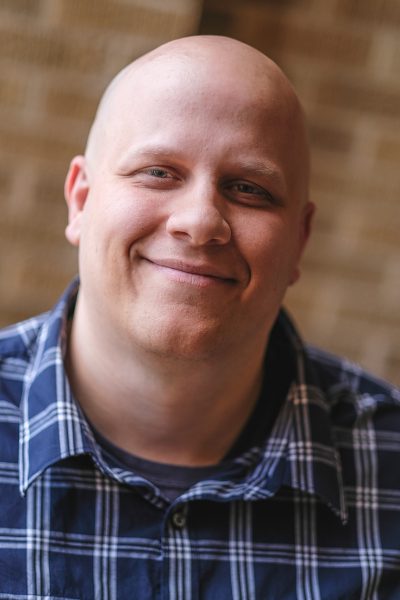
Andy J. King, assistant professor in Iowa State University’s Greenlee School of Journalism and Communication, was awarded a grant in the amount of $396,908 from the National Institutes of Health National Cancer Institute (NCI) to study communication related to colon cancer screening (CRCS).
King will lead a team of researchers from Iowa State, Cornell University and New York University as they use innovative, data-driven approaches — natural language processing and crowdsourcing — to monitor and evaluate public information and communication disparities about CRCS.
Incidence and death rates due to colorectal cancer are higher among Black Americans than non-Hispanic white Americans. One area in which disparities exist is in screenings, which are crucial for finding precancerous polyps so they can be removed and detecting colorectal cancer early, when treatment works best.
Through this four-year research project, King and his team hope to identify what messages and information are most effective in supporting adherence to CRCS recommendations and ultimately improve screening acceptance and behaviors in at-risk communities.
“There is a critical need to understand which messages resonate among populations at-risk for specific diseases, such as colon cancer, particularly for people who may have concerns about engaging in early detection behaviors like screening. This becomes even more important if someone is facing disparities in exposure to useful strategic public health information online,” King said.
The project is funded through an NCI Method to Extend Research in Time (MERIT) Award, which provides longer term grant support to Early Stage Investigators and the opportunity to apply for an extension up to two years. The estimated total funding for the project is $1,548,266. NCI is the federal government’s principal agency for cancer research and training and leads the nation’s research efforts to improve cancer prevention, detection, diagnosis and survivorship.
A data-driven approach
A challenge with colorectal cancer and CRCS is that it relates to a part of the body that most people are not particularly interested in having a conversation about, King said.
To overcome that challenge, King and his co-investigators planned a project with three components for a methodological approach that allows for a comprehensive approach to monitor, generate and evaluate message content through online forums and sources.
Their first study will use computational, natural language processing approaches to capture and analyze digital and social media information about CRC and CRCS to identify prominent messages, sources and types of misinformation, and information inequalities.
Through the use of wiki surveys, the second study will use crowdsourcing approach to assess population perceptions of public information and messages about CRCS and rank candidate messages.
The third study will test if messages selected for target audiences via the wiki survey are associated with intentions to adhere to screening recommendations in the future and share CRCS messages.
“We will be trying to determine if the messages and information people share in these online forums are useful to people who may not be actively seeking information about colon cancer screening. Our goal is to offer recommendations to health communicators about how best to communicate with at-risk audiences to overcome misinformation and promote adherence to screening recommendations,” King said.
A commitment to health communication
King holds a PhD from Purdue University and joined the Greenlee School faculty in 2018 from Texas Tech University. He also serves as affiliate faculty with Iowa State’s Human Computer Interaction Program and as an affiliated scientist with the National Institute of Antimicrobial Resistance Research and Education. King conducts research in strategic health and science communication, focusing on campaign and message design and evaluation, visual imagery, and public communication about health and science. His research seeks to use data to improve health campaign messages so that public health outcomes can be more broadly, equitably and efficiently achieved.
King has published over 45 peer-reviewed journal articles in outlets including Journal of Health Communication, Cancer Epidemiology, Risk Analysis, Journal of Communication and Health Communication. He is a senior editor for Health Communication and serves on the editorial boards for Communication Monographs and Journal of Health Communication.
“Science communication is a growing area of research strength within the Greenlee School, and Dr. King’s expertise in health communication is an important contributing factor. In addition to supporting graduate assistantships, this federal grant has the potential to provide opportunities for research collaborations across campus and increase visibility in this area among our students, our alumni, and the industry,” said Michael Dahlstrom, Greenlee School director and LAS Dean’s Professor.
The project’s research team brings together experts in computation, data science, social influence and health communication for an interdisciplinary approach.
King’s co-investigators are Jeff Niederdeppe, a professor in the Department of Communication at Cornell University, Drew Margolin, an associate professor in the Department of Communication at Cornell University, and Rumi Chunara, an associate professor of computer science, engineering and biostatistics at New York University. Dan Nettleton, who is Distinguished Professor & Chair of the Department of Statistics, Laurence H. Baker chair in Biological Statistics, and Director of the Baker Center for Bioinformatics and Biological Statistics at Iowa State University, is also collaborating with King on the grant.
“Early detection of cancer can save lives and improve people’s quality of life. There’s a lot of misinformation and misunderstanding about cancer screening, and figuring out ways to help people make informed decisions about screening through cancer communication efforts is a worthwhile goal,” King said.
